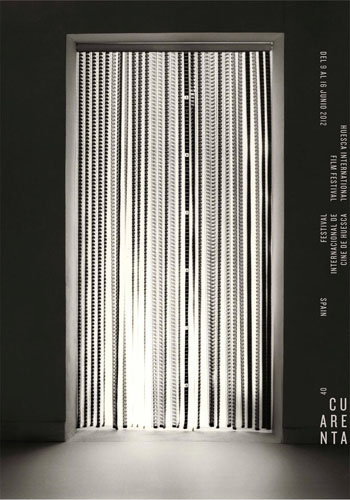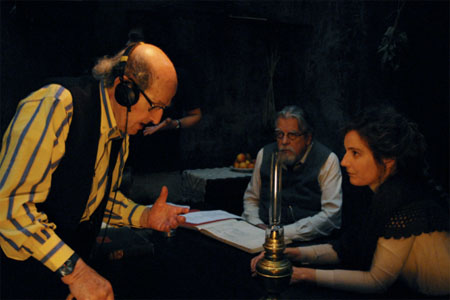The 40th edition of the Huesca International Film Festival, one of the oldest short film festivals in Spain, opens today and runs through June 16. That fine poster over there is designed by Chema Madoz.
New York. This afternoon at Light Industry: “Shot in 1972, first shown in 1975, and newly restored by the Cineteca di Bologna, Alberto Grifi and Massimo Sarchielli’s Anna is an astonishing nearly four-hour documentary about a 16-year-old homeless junkie, eight months pregnant, whom the filmmakers discovered in Rome’s Piazza Navona.”
Director Amy Seimetz will be on hand this evening for a Q&A following a screening of Sun Don’t Shine as part of Rooftop Films’ ongoing 2012 Summer Series. The New Yorker‘s Richard Brody calls Sun “a Southern road-movie film noir in contemporary Florida with a pair of actors (Kentucker Audley and Kate Lyn Sheil) who inhabit their roles in a murder plot with a quiet fury. Seimetz, who is best known as an actress (in such films as Alexander the Last and Open Five), finds amazingly simple yet powerful ways to get inside her characters’ minds while not straying from their story. There’s nothing neoclassical about her movie—it’s an exemplary work of modern cinema, made with an impressive curiosity and spontaneity—but it takes its place in the front rank of movies that extend genre by infusing it with the stuff of lived experience, of which, for movie artists such as Seimetz, movie-watching itself is a crucial part.” Interviews with Seimetz: Leah Churner (L; she’s also reviewed the film for Cinema Scope), Steve Dollar (GreenCine Daily; review), Kate Gellene (Rooftop), and Stephen Saito.
Berkeley. The title of the Pacific Film Archives series Afterimage: Three Nights with Nathaniel Dorsky is to be taken literally as, following tomorrow night’s screenings, Dorsky will discuss his work with curator Mark McElhatten. Max Goldberg in the San Francisco Bay Guardian: “It’s commonly said of Nathaniel Dorsky’s films that they are beautiful beyond words. Which is true as far as it goes, but then the same could be said of many poems and they are words. What’s clear is that Dorsky is absorbed with a classical fulfillment of form, and as such his films do better with poetics than interpretation (he has himself supplied a fine entry point with his slim volume Devotional Cinema). Poetics in this context means respecting the mystery and proceeding gingerly with gesture, metaphor, and detail. No one ever says of a Dorsky film, ‘I liked it the more I thought about it.’ Conversely, watching a second or third time one marvels to find the beauty springing to life with the same force, subtler and lovelier now for this trick of renewal. No one ever says of a sunset, ‘I’ve seen this one before.'”
London. This weekend, “the BFI is honoring Shyam Benegal, one of India’s leading directors,” notes Alison Frank for Wide Screen Journal. “Considered one of the founders of India’s ‘New Wave,’ Benegal began his film career in the 1970s. From then to this day, his work has successfully trod the line between Bollywood and art cinema.”
In the works. “Gebo e l’Ombra (Gebo and the Shadow), the latest work from 103-year-old Portuguese director and screenwriter Manoel de Oliveira, will screen at the next edition of the Venice Film Festival, the Italian media reported Friday.” Eric J. Lyman has details in the Hollywood Reporter: “The film, a historical drama set in the 19th century about a poor but respected patriarch who sacrifices himself to save his son, stars Claudia Cardinale, Jeanne Moreau, and Michael Lonsdale in the main roles.” But wait, there’s more: “de Oliveira has already started work on his next project, A Ingreja do Diabo (The Devil’s Church), which tells the story of the aftermath of the Devil’s visit to earth. That film is tentatively scheduled for release next year.”
Daniel Auteuil’s directorial debut, The Well Digger’s Daughter, based on the novel by Marcel Pagnol, was quite a hit in France last year. At Cineuropa, Fabien Lemercier reports Auteuil has already begun shooting the first two adaptations of Pagnol’s Fanny Trilogy. Pagnol himself, of course, adapted his own plays, Marius, Fanny and César in 1931, 1932 and 1936, respectively.
Reading. There’s a fresh round of work up at The Chiseler, including Dan Callahan‘s piece on Ruth Hussey.
And finally for now, “This will be the year that revenue from streaming passes revenue from DVD sales, according to a recent article in the Hollywood Reporter.” Roger Ebert asks, “How do we feel about this?” Naturally, we’re feeling pretty good about it, and we’re especially appreciative for his devoting much of the column to Fandor.
For news and tips throughout the day every day, follow @KeyframeDaily on Twitter and/or the RSS feed. Get Keyframe Daily in your inbox by signing in at fandor.com/daily.





